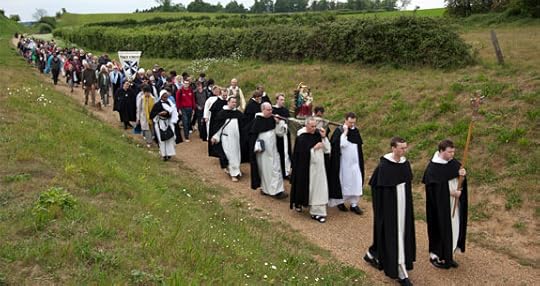In the Middle of the Journey

In the Middle of the Journey | James Kalb | Ecclesia et Civitas | Catholic World Report
Catholics need to oppose the movement toward a society that prizes above all else security, efficiency, and the ever-more-demanding liberal version of human rights.
The Church favors peace, and her basic concern—leading men to God—is not specifically political. For that reason, her approach to politics has generally been irenic. She urges the faithful to obey the law, respect the powers that be, and interpret motives in a favorable light. She offers criticism at times, since she has her own view of social relations, but her normal approach to the political order is cooperative.
From that standpoint, the 19th and early 20th-century Church—which found herself denouncing the dominant tendencies of the age—appears the exception. The reason for her approach was defense of herself and the faith. She was being deprived of her position in society, for example in education and in matters relating to family life. In many countries her property was confiscated and her right to run her own affairs denied. In some places persecution went to violent extremes, as in revolutionary France, Mexico, Spain, and Russia.
Such events reflected a general attempt to replace Christianity as a social authority with an understanding of man, the world, and social obligation that leaves God out of the picture. The Church was no longer facing the usual problem of flawed government, or even the problem of a tyrant who preferred his private to the public interest. She was facing a powerful movement that wanted to eliminate Catholicism as a public presence and would go very far to do so. In such a setting usual approaches no longer seemed to apply.
After the Second World War there was a general relaxation of ideology in the West. War and revolution had shown the dangers of extremism, common struggle against manifest evil had deepened feelings of kinship, and a kinder and gentler form of liberal modernity seemed ready to accept the need for ethical values that were independent of the state. The political authorities seemed ready for the Church to put forward what she had to offer, and to accept the principled cooperation of those who accepted her message.
Vatican II therefore signaled a reversion to the Church’s usual attitude of general acceptance and support for the political powers that be. Modernity seemed here to stay, it had brought some good things, its basic goals could be seen in a positive light, and it now seemed willing to let the Church try to supply what it lacked. If she could find the right way to do so, she might be able to restore her lost position of rightful influence, perhaps in a different form. So why not give it a try?
Carl E. Olson's Blog
- Carl E. Olson's profile
- 20 followers



